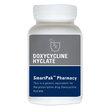Pronunciation
dok-see-SYE-kleen HI-klayt - Pronunciation guide
Brand Names
- Doxirobe Gel
Description
 Doxycycline hyclate is an antibiotic composed of a semi-synthetic tetracycline derived from oxytetracycline. Doxycycline is available in hyclate calcium and monohydrate salts. It occurs as a yellow, crystalline powder and is also known as doxycycline hydrochloride. Hyclate salt made into oral tablets and capsules is used in treating horses.
Doxycycline hyclate is an antibiotic composed of a semi-synthetic tetracycline derived from oxytetracycline. Doxycycline is available in hyclate calcium and monohydrate salts. It occurs as a yellow, crystalline powder and is also known as doxycycline hydrochloride. Hyclate salt made into oral tablets and capsules is used in treating horses.
Usage
Doxycycline is an antibiotic used for treating bacterial infections, including Potomac Horse Fever, other Ehrlichia infections, and Lyme disease. Doxycycline generally has similar activity to other forms of tetracyclines against susceptible organisms, but some strains of bacteria may be more susceptible to doxycycline.
Important Note: Intravenous injection of doxycycline has been associated with cardiac arrhythmia, collapse, and death in horses.
Dosage and Administration
 Doxycycline Hyclate Doxycycline Hyclate |
||||
|---|---|---|---|---|
| Method | Dosage (click row for calculator) |
Concentration | Period | Duration |
| Oral | 10 mg/kg | 100 mg/tablet | Daily | NA |
Notes:
|
||||
| Method | Amount | Dosage | Period | Duration | Note |
|---|---|---|---|---|---|
| Oral | 10 | mg/kg | Every 12 hours | 5 days | Potomac horse fever. Dissolve tables in water and administer by nasogastric tube or syringed into mouth. |
| Oral | 10 | mg/gk | Every 12 to 24 hours | Up to 30 days | Lyme disease |
Other uses: Dosage/administration per veterinarian's prescription.
Side Effects
Photosensitivity and, rarely, liver damage and blood disorders have occurred with doxycycline use.
Long-term use of doxycycline may result in overgrowth of non-susceptible bacteria or fungi.
Precautions
Due to the possibility of fatalities, intravenous injections should not be used in horses until further studies documenting the safety of intravenous doxycycline in horses are conducted.
Because doxycycline can retard fetal skeletal development and discolor deciduous teeth, it should be used only in the last half of a mare's pregnancy and benefits should outweigh fetal risks.
Doxycyline is a prescription drug restricted to use by or on the lawful written or oral order of a licensed veterinarian.
Check with the appropriate individual regulatory body regarding use in competition horses.
Interactions
Oral antacids, saline cathartics, and other GI products containing aluminum, calcium, magnesium, zinc, or bismuth decrease the absorption of doxycycline. Oral doxycycline should be given at least 1 to 2 hours before or after products containing these ingredients.
Oral sodium bicarbonate, kaolin pectin, or bismuth susalicylate may impair doxycycline absorption when given together orally.
Doxycycline may interfere with bactericidal activity of penicillins, cephalosporins, and aminoglycosides.
Doxycycline may increase the bioavailability of digoxin and lead to digoxin toxicity. When used in horses on anticoagulant therapy with medications such as warfarin, dosages may need adjustment.
Doxycycline may cause falsely elevated values of urine catecholamines and may cause false-positive urine glucose results, depending on the method of testing urine glucose.
Overdose
Oral use of doxycycline in horses is quite safe. Any overdose may create digestive disturbances, such as diarrhea. Should a horse develop severe diarrhea, fluids and electrolytes should be monitored and replaced if necessary.
Images
 Doxycycline Hyclate
Doxycycline Hyclate
Literature
